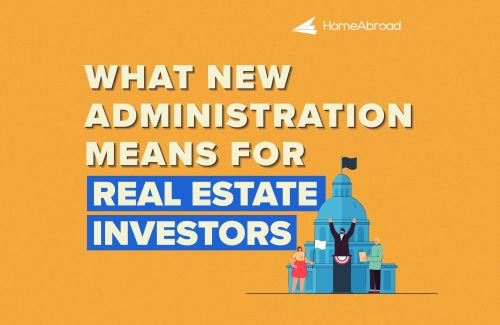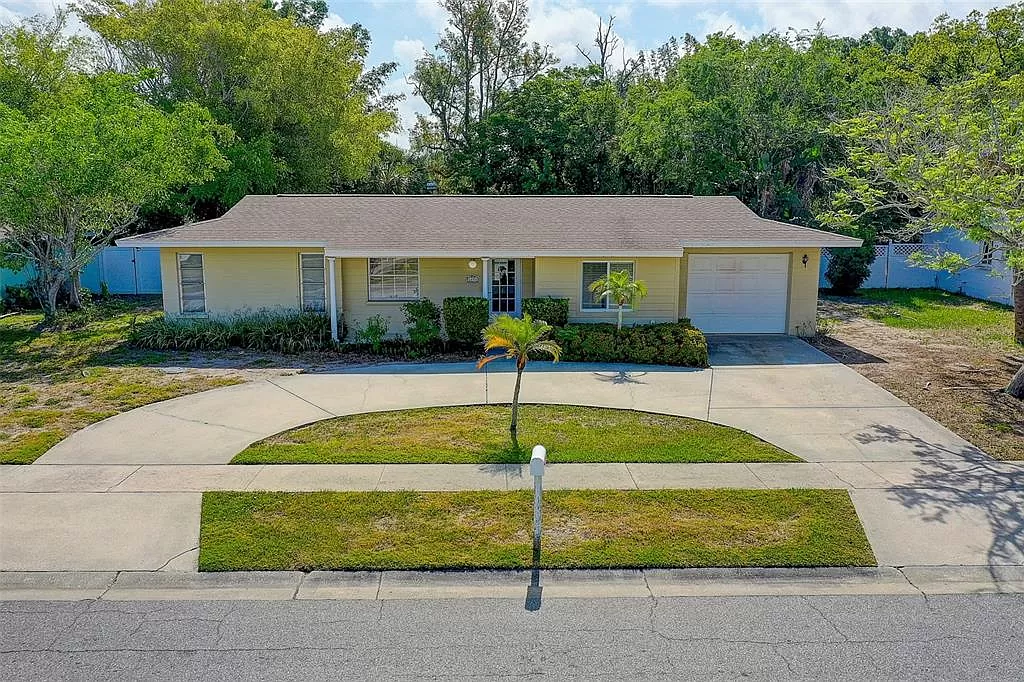Editorial Integrity
Making informed real estate decisions starts with having the right knowledge. At HomeAbroad, we offer US mortgage products for foreign nationals & investors and have a network of 500+ expert HomeAbroad real estate agents to provide the expertise you need. Our content is written by licensed mortgage experts and seasoned real estate agents who share insights from their experience, helping thousands like you. Our strict editorial process ensures you receive reliable and accurate information.
Key Takeaways:
➡️ In 2017, Donald Trump reduced the corporate tax rate from 35% to 21%. He now proposed cutting it further to 20%, offering investors an opportunity for considerable tax savings.
➡️ Trump has also mentioned to reinstate 100% bonus depreciation, a move that would allow investors to take significant deductions on qualifying assets.
➡️ Additionally, he has proposed a universal tariff of 10% to 20% on all US imports, along with a 60% tariff on goods from China. While intended to bolster domestic industries, these tariffs could increase construction costs, potentially conflicting with his goal of reducing housing costs.
Table of Contents
For the first time, housing has taken center stage in a presidential campaign. With property prices at record highs and mortgage rates soaring, home affordability has reached a critical low.
In his Agenda 47 platform, Donald Trump outlined several initiatives aimed at addressing these challenges and revitalizing the housing market.
However, what do these promises mean for real estate investors?
We’ve broken down the policies and translated them into actionable insights to help you anticipate the housing market in the coming days.
1. Lower Mortgage Rates
One of the most significant benefits for real estate investors under the new administration is the potential for lower mortgage rates.
Lower inflation, a priority in Trump’s agenda, is expected to stabilize interest rates, making borrowing more affordable for investors.
While the specifics of how inflation will be reduced remain unclear, Trump has frequently pointed to the Federal Reserve as a lever for influencing rates.
He has voiced his opinions on the Federal Reserve Chairman’s role in rate adjustments, often emphasizing the need to cool down interest rates.
Although interest rates are set by the Federal Open Market Committee (FOMC) and not a single individual, Trump has made it clear that he intends to express his views. At the Chicago Economic Club in October 2024, he remarked,
I think I have the right to say, ‘I think you should go up or down a little bit.’ I don’t think I should be allowed to order it, but I think I have the right to put in comments as to whether or not the interest rates should go up or down.
While interest rate changes are largely influenced by the bond market, investors can remain optimistic given Trump’s determination to make America affordable again.
2. Increased Housing Inventory
The US housing market currently faces a severe shortage, with an estimated 4.5 million homes needed to meet demand, driving up prices and limiting affordability.
Trump’s housing plan proposes addressing this issue by allowing new construction on federal lands under “ultra-low tax” and “ultra-low regulation” conditions, as mentioned during his speech at the New York Economic Club.
The administration also plans to reform corporate taxes and streamline regulations to encourage new construction. In a Bloomberg interview, Trump drew on his real estate experience, remarking, “I went through years of zoning. Zoning is like… it’s a killer.”
According to a 2021 study by the National Association of Home Builders, government regulations—including zoning, permits, safety, labor, and environmental requirements—account for an average of 23.8% of construction costs.
Reducing these burdens could significantly lower costs for developers, encouraging more housing projects.
If implemented effectively, these measures could address the housing shortage while making it cheaper and faster for developers to construct new homes, ultimately benefiting investors through increased inventory and market activity.
3. Reduced Property Prices
Increasing inventory through new construction on federal lands and reforming construction regulations could help make housing more affordable.
Trump’s proposal of “ultra-low taxes” and “ultra-low regulations” on federal lands is aimed at encouraging developers to build more homes, addressing the current housing supply shortage.
This approach could effectively cool down property prices if executed as planned.
However, not all policies may align seamlessly with this goal. During his campaign, Trump blamed 21 million illegal immigrants for driving up property prices and promised mass deportations as a solution.
On Monday, Nov 18th, Trump confirmed plans to declare a national emergency and use military resources to carry out mass deportations. While intended to reduce competition for housing, this move could have unintended consequences.
He also replied to a post on this matter:

According to the National Association of Home Builders, immigrants make up 25% of construction workers. Mass deportations could significantly increase labor costs, ultimately driving up construction expenses and home prices—a counterproductive outcome for housing affordability.
Another potential obstacle is tariffs. Last month at the Chicago Economic Club, Trump said,
To me, the most beautiful word in the dictionary is tariff, and it’s my favorite word.
While tariffs aim to protect domestic industries, they could raise the cost of construction materials, further inflating property prices.
While this might seem confusing, the administration’s aim to reduce property prices suggests that policy execution will likely be adjusted to align with and achieve this goal.
4. More Emerging Real Estate Investment Opportunities
Trump’s focus on infrastructure investment and urban revitalization could create a lot of new hotspots for real estate investment.
The emphasis on highways, bridges, and community projects not only makes properties more accessible but also increases their desirability.
Real estate near new infrastructure projects has a strong potential to appreciate, and we’re likely to see this trend accelerate with this new administration in action.
5. Tax Incentives
Trump’s 2024 GOP platform highlights a focus on boosting homebuilding by lowering corporate taxes, cutting federal regulatory costs, and utilizing federally owned land for housing development.
Trump has also suggested minimizing entitlement processes and taxes on these projects to further encourage developers.
The campaign has also pledged to “promote homeownership through tax incentives and support for first-time buyers.”
These initiatives could drive demand for new homes while presenting lucrative opportunities for developers and investors to meet the increasing market needs.
The new administration’s policies bring optimism to real estate investors with opportunities like lower mortgage rates, increased inventory, and tax incentives to foster a favorable market.
Even in the current market, the US remains a top destination for property investments, offering affordable property prices compared to global metro cities and exceptional rental growth of over 8%.
This makes US real estate a great option for generating cash flow while paying off mortgages and earning additional income.
If you’re an investor seeking such opportunities, HomeAbroad provides everything you need under one roof.
With our AI-powered property search platform, a network of 500+ specialized real estate agents, tailored investment mortgages, LLC setup services, and property management, we simplify the entire process.
Our experts also perform detailed investment analyses to ensure your property not only pays for its mortgage but also delivers positive cash flow.
Explore our case study of a South African investor we helped buy property in Ohio. The investor achieved a rental yield of 22% and a monthly cash flow of $1,742 after mortgage payments.
Ready to invest in a property like this? Reach out to HomeAbroad today!
At HomeAbroad, we ensure the reliability of our content by relying on primary sources such as government data, industry reports, firsthand accounts from our network of experts, and interviews with specialists. We also incorporate original research from respected publishers when relevant. Discover more about our commitment to delivering precise and impartial information in our editorial policy.



















